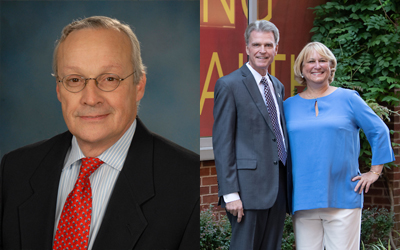UMB Awarded $2.75M for Research Lab, Professorships
The University of Maryland, Baltimore (UMB) has received $2.75 million in awards to fund a research lab and two research professorships through the Maryland E-Nnovation Initiative Fund (MEIF).
Administered by the Maryland Department of Commerce, the fund was created to spur basic and applied research in scientific and technical fields at colleges and universities. UMB raised a total of $2.75 million in private funding, and Maryland Commerce approved matching grants to support endowments supporting research in neurosurgery, bioengineering, and social work.
“Support for these endowed professorships represents a significant investment in scientific advancement, economic development, and social justice for all Marylanders,” said UMB President Bruce E. Jarrell, MD, FACS. “This enables UMB to attract and retain the most innovative research minds and also to expand educational opportunities for the next generation of health care, law, and social service professionals.”
An award of $750,000, matched by $750,000 in donations, will endow the J. Marc and Philippe Simard Neurosurgery Research Lab at the University of Maryland School of Medicine (UMSOM).
“With this, the first endowed laboratory at the School of Medicine, we can continue the innovative research developing novel agents that can reduce swelling and bleeding and minimize brain damage and improve clinical outcomes for patients with stroke and brain injury,” said UMSOM Dean Mark T. Gladwin, MD, vice president for medical affairs, UMB, and the John Z. and Akiko K. Bowers Distinguished Professor.
A professor of neurosurgery, pathology, and physiology who has been on the faculty of UMSOM for 30 years, J. Marc Simard, MD, PhD, is close to a breakthrough in developing an alternative treatment for some strokes and traumatic brain injuries that will not require dangerous brain surgeries.
“This award is very special and unique, because it enables the establishment of an endowed research laboratory, which will be the first one at the University to have that designation,” Simard said. “The endowment will supply funds essentially in perpetuity, helping the lab in its goal to advance the science and understanding of neurosurgery and neurological diseases.”

From left, J. Marc Simard, MD, PhD; Mark A. Reynolds, DDS ’86, PhD, and Karen J. Ivers, DDS ’88.
Another $1.5 million was awarded to the University of Maryland School of Dentistry (UMSOD) to fund the Karen J. Ivers, DDS Endowed Professorship in Bioengineering. Matched by a $1.5 million donation from Ivers, the award will support a professor specializing in advanced biomaterials, tissue engineering, and reparative medicine in the field of oral, dental, and craniofacial science.
“I am grateful for this generous investment by the Maryland E-Nnovation Initiative Fund, which is administered by the Maryland Department of Commerce,” said Mark A. Reynolds, DDS, PhD, dean and professor at UMSOD. “The matching funds will advance transformative clinical and translational science in dentistry and position our scientific programs as a platform for training and mentoring the next generation of clinicians and scientists.”
“It will also allow us to increase our portfolio of intellectual property and enhance the transfer of new technology into entrepreneurial start-up companies, to increase federal funding of oral and craniofacial bioengineering, and to create jobs and help drive economic growth in Maryland,” Reynolds continued.
A 1988 alumna, Ivers has shown her dedication to her alma mater with her gift. As a dentist in private practice in Chevy Chase, Md., she also served as a Dean’s Faculty member at UMSOD.
“I am thrilled that my gift will now have double the impact. It will create a solid foundation for research, education, and commerce,” said Ivers.
The University of Maryland School of Social Work (UMSSW) received a $500,000 award, matched by $500,000 in qualified donations, to support the newly created Woodside Professorship in Economic Justice and Financial Social Work. The school plans to use this position to recruit a world-class clinical professor and researcher in financial social work and economic justice to Maryland.
“The MEIF grant affords us the opportunity to bring in a specialist in developing and expanding an economic justice program in Baltimore and across the state, working with our schools across the campus to really focus on the economic well-being of individuals, families, and communities in Maryland,” said Judy L. Postmus, PhD, ACSW, dean and professor, UMSSW.
The professorship expands on the work of alumna Meg Woodside, MBA, MSW ’07, who co-founded the Financial Social Work Initiative (FSWI) at UMSSW in 2008 with alumna Robin McKinney, MSW ’01. The new professorship builds upon 15 years of FSWI’s work to integrate social work practice and theory into the fields of individual and community wealth building and prepare social workers to advance economic justice and financial well-being.
“The person in this role will focus on bringing financial stability and prosperity to vulnerable and underserved communities in the state — designing and building social work education, practitioner trainings, and community-serving programs that address issues of economic injustice and drive individual and community economic empowerment,” said Woodside. “Weaving through all of that will be research that informs practice in the community to develop evidenced-based practices to uplift the economic prosperity of Marylanders.”
The Maryland E-Nnovation Initiative was created by the General Assembly during the 2014 legislative session and has provided more than $72 million in funding to leverage $80.7 million in private donations. The funding can be used to pay salaries of newly endowed department chairs, staff, and support personnel in designated scientific and technical fields of study; fund related research fellowships for graduate and undergraduate students; and purchase lab equipment and other basic infrastructure and equipment.



